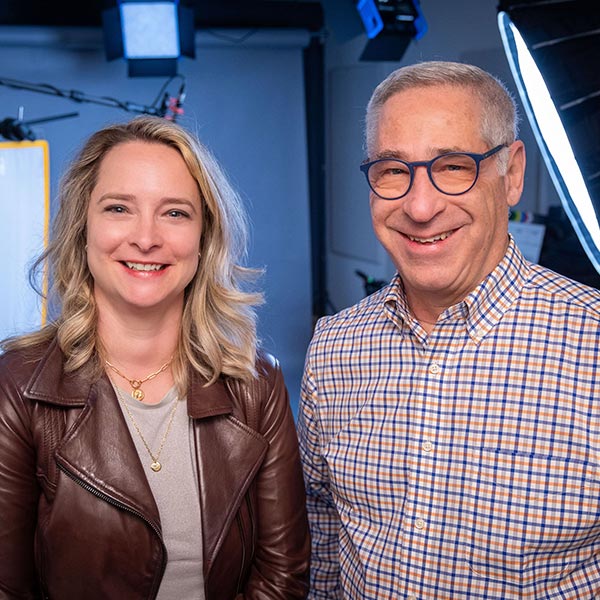Even at the best of times, many physicians are exposed to more than their share of suffering on a daily basis.
“That can be what we call ‘vicarious trauma’ where you are impacted by the pain you are exposed to,” says Patricia Dobkin, a clinical psychologist, an associate professor in McGill’s Faculty of Medicine, and the author of two books on mindful medical practice.
“With COVID-19, this is going to be a chronic form of adversity. So, we really need to step up and get strong so we can deal with it,” Dobkin said when she presented medical grand rounds at the McGill University Health Centre (MUHC) in a March webcast.
Physician well-being is now the focal point of Dobkin’s work. Affiliated with McGill Programs in Whole Person Care, Dobkin leads and studies two psychosocial programs – Mindfulness-Based Medical Practice and Mindfulness-Based Stress Reduction (MBSR). The former is designed to promote well-being in health care professionals. It’s modeled after the MBSR program launched at the University of Massachusetts Medical School by Dr. Jon Kabat-Zinn.
Dobkin has also been offering a two-part course in physician wellness at the MUHC.
‘Self-care is not selfish’
“Physician resilience is vital now. We cannot let the statistics regarding burnout increase,” says Dobkin, who included some sobering numbers in her grand rounds presentation. A 2018 Canadian Medical Association National Physician Health Survey showed burnout at about 30 per cent and screening for depression at 34 per cent.
“I did [grand rounds] today because I really believe that your well-being is crucial and that self-care is not selfish,” Dobkin said. Doctors are trained to put others first, “but if you don’t take care of yourself, then you really can’t take care of others well – not in the long run. That’s what the burnout data shows us.”
Dobkin talked about the Mindful Medical Practice course offered by McGill Programs in Whole Person Care for the past 14 years – an idea she initially proposed.
“Research supports that mindful practice contributes to physician well-being, increases quality of care – more safety than errors – and quality of caring, with empathy rather than detachment.”
The characteristics of a mindful clinician include being fully present in the moment, having a curious, open mind and being non-judgmental.
She shared video clips during grand rounds illustrating how doctors can pause and act with awareness, which two of her studies showed led to less emotional exhaustion. One clip featured a doctor taking a deep breath and pausing before entering an exam room. In another, alone in his office, he closed his eyes and sat in meditative silence for a minute.
“I hope that shows you that this is realistic,” Dobkin said. “Often people say I don’t have time to do any more. And I reply it’s not necessarily a question of time, it’s a question of remembering to pause and be present.”
An early interest in mind-body medicine
When she was 19, Dobkin lived in Auroville, an international spiritual community in India. “It completely changed my life,” she says, “in that it showed me that work can be in the service of a higher good. It gave me a direction – and here I am, doing just that.”
“I was a hippie full of ideals, wanting to change the world,” she laughs, and the experience planted the seeds for her future work.
“Who knew that later in my life, I would actually be able to apply this in a rigorous, research-oriented way.”
As a graduate student, Dobkin was interested in how the mind and body work together.
“It was ‘psychosomatic medicine’ and then it became ‘behavioral medicine’, which made it more respectable. ‘Health psychology’ morphed into ‘mind-body medicine’.”
She was intrigued by the work of a Harvard research group in the 1970s that studied gurus in India who could meditate in the freezing cold and bring their body temperatures up.
Dobkin did her undergraduate degree at McGill, majoring in psychology. The late Dr. Ronald Melzack, the renowned pain pioneer, was her mentor.
“I was an American student who didn’t have the right to work in Canada and he got me a job. I was his research assistant in the Montreal General Hospital pain clinic. I was his student and he changed my life.”
Dobkin was recruited back to McGill as a post-doc. She travelled to the U.S. for MBSR training offered by Kabat-Zinn. She attended the sessions with Dr. Balfour Mount, the father of palliative care in Canada who launched McGill Programs in Whole Person Care (WPC), and Dr. Tom Hutchinson, WPC’s current director.
“Then I had this epiphany. I said to Tom: ‘What if we took this course and modified it for doctors?’”
Dobkin began offering a Mindfulness-based Medical Practice course to doctors. Many were mid-career. Some were losing their love of medicine, others were looking for more balance, she says.
“Some of them had meditated on their own and needed structure to learn how. Also, they needed to do this in a community where it wouldn’t be seen as ‘woo woo’…We had to offer it in the language of medicine. And I’m a good translator in that way,” says Dobkin, who notes that meditation is just one component of the program.
She also adjusted the course for fourth-year McGill med students and she and Hutchinson started teaching it to them in 2008.
Dobkin collected data to see if the courses were having an impact. The results showed improvements among participants. For example, burnout measures of emotional exhaustion and depersonalization – treating patients more like cases than human beings – both declined.
A new Mindful Medical Practice course has been in McGill’s curriculum since 2015 and is now mandatory for med students.
Improving patient care is ultimate goal
Every spring, Dobkin offers the Mindfulness-Based Medical Practice program for health care professionals. (This year’s session has been rescheduled for the fall because of the coronavirus.) Among other things, she introduces participants to several different ways of meditating, including “mindful movement” (yoga).
Patient care is the driving force behind her efforts. “If the doctors are hurting, their ability to offer the best care possible is impaired,” she says. “So it goes both ways. When I help the doctors be well, they provide compassionate service…it’s a win for everybody.”


